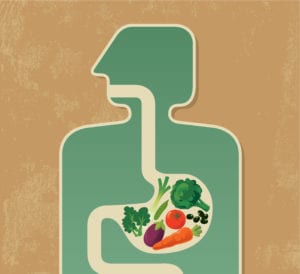Digestion & Health
Some argue that good health starts with good digestion (I’m one of them). Without good digestion, you can’t absorb the nutrients you need and therefore, you are not able to live a healthy life. Let me ask you this, if you eat an apple and none of it is absorbed and used in your body, what was the point of eating the apple in the first place?
If you’re feeling sluggish, bloated, and low on energy, then taking a look at your digestive system is a great place to start!
These 10 tips will help you pay better attention to your body and give it the best chance possible to make the most out of all of the wonderful foods that you feed it.
1. Chew a lot
Let’s face it, no one has time to count to 20 each time they take a bite of food. So don’t. Just keep in mind that with every grind of your teeth those little bits of food become smaller and much easier to digest further along in the process. Also, the longer you keep food in your mouth the more time your saliva has to start digesting certain nutrients such as starches. So next time you eat a meal, be conscious and chew more than you normally would.
2. Drink water, but not with meals
Drinking water is essential to life. Period. No water, no life. Remembering to stay hydrated, especially in the summer, is vital to your health. Water helps flush out toxins from the body as well as provide cells with hydration. Your digestive system relies greatly on the liquidity of water and serious problems can arise when not enough is present.
Avoid drinking water 30 minutes before and up to 1 hour after eating a meal. Water intake during this time will dilute your precious stomach acid that is needed for optimal digestion. Stomach acid and it’s enzyme partners are responsible for breaking down proteins, carbohydrates and fats. Without the full force of your stomach acid, a lot of these molecules will be intact as they flow into the intestines where they will be impossible to absorb due to their size. Unabsorbed molecules in the intestines are left to ferment and can result in free radical formation as well as unwanted smelly gas (no thanks!)
3. Eat mindfully, slowly, and happily
Your mental state affects how well your food will be digested. Most of us fall into the trap of eating on the go and not paying attention to what we are doing. Your body will be relaxed and better suited to digest what you feed it when you are seated and calm. Focus on what you are eating and savor the flavors as you go. Don’t eat when you’re stressed or emotional. In this state your body is focusing all of its available energy on sending blood throughout your body in a case of “fight or flight” response. Very little of the nutrients you eat in this state will actually be absorbed and used. So don’t bother. Eat only when calm, relaxed and you have the time to be mindful.
4. Avoid inflammatory foods or any food you are sensitive to
Inflammatory foods can cause inflammation in your digestive tract and wreak havoc on the good bacteria living there. Eating foods that you are sensitive to has a similar effect. Both responses damage the important process that allows your body to absorb what it needs. Staying conscious of these foods and limiting them are highly recommended. Common inflammatory foods are gluten, dairy, red meat, processed foods, sugar, and alcohol.
5. Exercise daily
The movement and increased blood flow that results from being active will help food move gracefully through your digestive system. Did you know that it can take up to 10 hours for one meal to move from the mouth to the toilet? That’s a long time for your body to be working hard! A good exercise routine can help smooth out and improve this processes. Get moving on a daily basis,even if only for 20 minutes. Take a short walk, take the stairs, park at the far end of the parking lot and walk the extra distance. Every bit helps and your digestive system will thank you.
6. Eat both soluble and insoluble fiber
Fiber comes in two basic forms and both are extremely important to include in your diet. Soluble fiber mixes with liquid in your digestive tract and helps keep things moving along. It also helps carry out “bad” cholesterol from your cells. Insoluble fiber doesn’t get fully broken down during digestion and is left to ferment in your intestines. Don’t worry, fermenting isn’t a bad thing here. It actually provides for the bulk and softness of your stool while also acting as a great food source for your “good” gut bacteria.
You can find soluble fiber in onions, bananas, oats, apples, peas, beets, and legumes. Insoluble fibers are found in whole grain foods, legumes, leafy greens, and nuts/seeds. Including a variety of fresh vegetables, fruits, legumes, nuts, and whole grains into your daily diet will ensure your digestive system is working at it’s finest.
7. Manage your stress
As mentioned above, your emotional state has a huge impact on the function of your digestive system. When you are in a place of constant stress, your body uses all of its resources and energy to focus on the possible threat at hand. Digestive enzymes are limited as is blood flow and function of your digestive tract. Constant stress can also lead to chronic inflammation which as noted above also has a very negative impact on your body’s ability to absorb nutrients. Keeping your stress in check is extremely important if you intent to be healthy and happy. Find moments to take deep breaths throughout the day, take up yoga, or try meditation.
8. Eat heavier meals during the day and lighter meals in the evening
As mentioned above, it can take up to 10 hours for food to make it’s way through your digestive system. Your body needs time to undergo complex chemical reactions and break down hard to digest nutrients. Heavy proteins and fat are the hardest and most complex molecules for your body to break apart and digest. It is wise to pay attention to eating lighter meals low in these nutrients during the evening hours before bed. A good rule is to eat nothing 1-2 hours before bed, and to not eat anything heavy 2-4 hours before bed.
During sleep your body needs it’s energy to focus on detoxing your body and cleaning out your organs. When you stomach is full of undigested food, your body does not have the time or energy to undergo its normal nighttime routine which can cause you to become sluggish or even put on weight.
9. Eat fermented foods/drinks daily
We have all been hearing about the importance of ramping up the “good” bacteria in our gut. What you need to know is that these bacteria not only keep the “bad” bacteria in line, but they also help produce valuable vitamins and keep our mental state and emotions in check. Unfortunately, in today’s day and age, our diets and lifestyles cause extreme damage to our gut bacteria. With being sedentary, eating highly processed and fatty foods, and taking antibiotics for everything, our bodies don’t stand a chance.
One great way to start reviving the good guys in our gut is by including fermented foods and drinks into your daily diet. Fermented foods are loaded with healthy bacteria that can help replenish what we need in our guts. Fermented foods are also much easier to digest for people who may have food sensitivities. Often those who are lactose intolerant can in fact tolerate yogurt.They are also easy to make at home (if that’s your thing) and come in many forms. My favourites are miso paste (for salad dressings or soup), Kombucha (for a refreshing drink), kefir (for my morning granola), and Kimchi (for a great sandwich topper).
10. Limit bad habits (smoking, caffeine, alcohol)
Sure, they may taste good and you may enjoy them, but is it really worth it? Is the damage we are doing to our digestive system worth the daily coffee or pack of cigarettes? I don’t believe it is. Indulgences such as smoking, coffee, black tea and alcohol create a very acidic environment in the body and can lead to inflammation among other serious problems. Both of these states create a very difficult time for your digestive tract. Another major issue is that most of these bad habits actually rob your body of food nutrients instead of letting them be absorbed and used in the body. We need every precious nutrient we ingest for our body to function. So, let’s give it a chance to do it’s job and save our digestive tracts from harmful chemicals and drugs. Limit your intake to a couple of times a week and you will be on the right track.

Now that you have a better idea of some ways to take care of your digestion, get to it. Pick 3 tips from above and get started this week!
Thinking about getting your gut back in shape but aren’t sure where to start or how to build this into your daily routine?
Get in touch with me by clicking here and book your free consultation today!
Love & Healthy Digestion,
Dani
P.S. I would love to hear your thoughts and comments on this topic. Come on over and join my amazing community of like-minded, health-conscious women on Facebook by clicking here:


